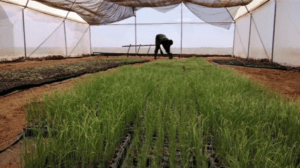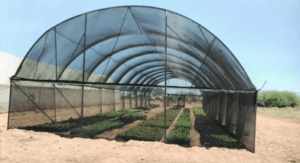 Stories
Stories
May 9, 2023 • 2 min read
Poverty and unemployment remain some of the key hardships facing young people in Lokirawot Village, Moroto District in Northern Uganda. Like many people in the region, young people rely on casual labour, sale of firewood and burning charcoal to make ends meet.
Unfortunately, with opportunities limited, many young people have been drawn to crime and cattle rustling. Through the Markets for the Youth Programme, GOAL teams are hoping to offer young people an alternative. A sustainable way for young people to upskill and escape from poverty. With support from the Mastercard Foundation, the programme is helping to create dignified and fulfilling agricultural work for 300,000 young people in rural Uganda.
Working Together Towards Positive Outcomes
A new youth group from Lokirawot Village is working with the programme and is being empowered to transform their community. By engaging with Markets for Youth, they are beginning to engage in commercial horticulture, which has contributed to income and food and nutrition security at both household and community levels.
Through training with AgroMax, a private sector partner on the programme, the 273-member group received guidance on agronomic practices such as crop farming and support to form a Village Savings and Loan Association (VSLA). They also receive training in the sale of tree and fruit seedlings for agro-forestry and information on bee-keeping.
Engaging with the programme has enabled members of the group to improve their income and food security in their homes. Participants are growing a diverse range of produce, including green-gram, watermelon, passion fruit, lacinia tree, eggplants, tomatoes and avocado. Some members have even been able to open small retail businesses to sell their produce.

New Diverse Skills
The youth group are eager to share their individual learnings from the training. Opio Isaac, a group member and former cattle rustler, is proud of his new range of skills. “Since the training, I’m now able to operate a tractor at our site and also get hired to operate other tractors,” says Opio. “My other name is now ‘poultry expert’ because it’s one of the duties I do best.”
Ritah Loile, another member of the group, says she is not only getting an income from her kitchen garden, but her children are also now eating nutritious food, which has curbed hunger and malnutrition in her family. She looks forward to expanding her operation. “My father-in-law offered me eight acres of land to farm, which I’m planning to use to grow in bulk next season,” Loile adds.
Challenges to Growth
The youth group faced many challenges along the way. Prolonged drought caused by climate change has impacted crop growth. Limited access to personal farm inputs like machinery is also an issue, as well as difficulty in accessing finance to expand their farm activities. To overcome these challenges, the group is hoping to connect individual farmers with private seed companies and explore new small-scale irrigation technologies to improve farmers’ links to markets. These new commercial horticulturalists aspire to use their acquired skills to become sustainably self-employed. As a result, participants’ incomes have been boosted. Sustainable access to food has greatly improved. And local communities have been transformed.

